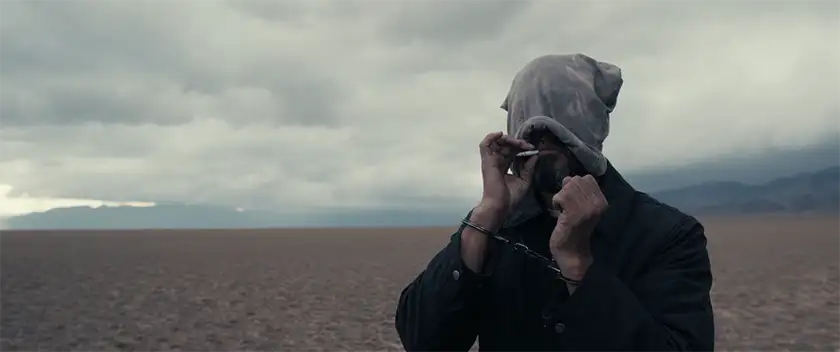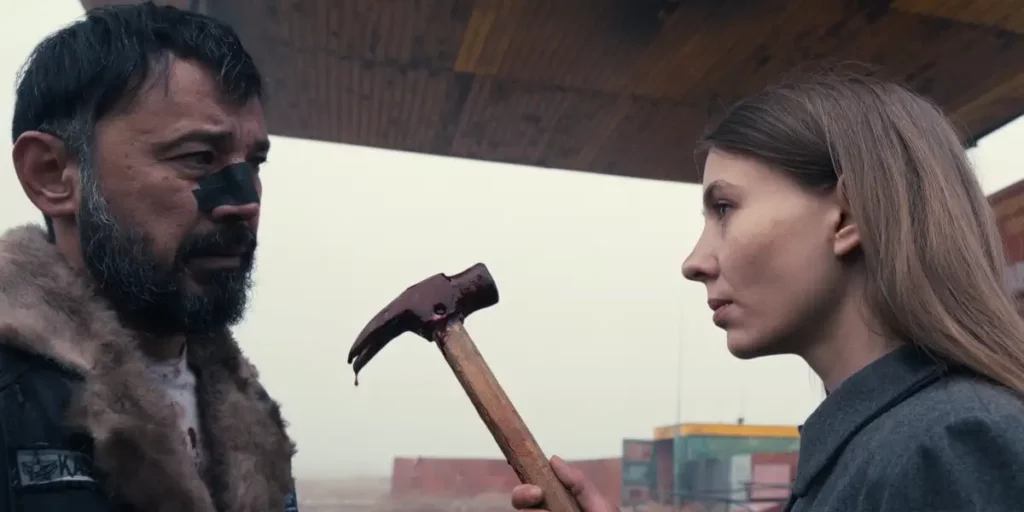Steppenwolf delivers the unique dystopian atmosphere that it promises, but the character work and storytelling leaves much to be desired.
Director: Adilkhan Yerzhanov
Genre: Horror
Run Time: 102′
EIFF Screening: August 16, 2024
Release Date: TBA
From the beginning of Steppenwolf, it’s clear that something isn’t quite right in this dystopian world. The police have no power, the roads are empty and desolate, and money seems to be even more precious than it is today. It’s a world of the future, and not one that we’d like to see come true.
The story kicks off with terrorists taking over a police facility in this broken wasteland, leaving one morally questionable officer named Brajyuk (Berik Aitzhanov) left to fight for his life. But when he encounters Tamara (Anna Starchenko), he sees an opportunity to band together and fight against their common enemy in a glorious tale of revenge.
While that’s all captivating enough, the problem with Steppenwolf is that it never goes any further than that. We never learn more about what caused this dystopian world or why it happened, and we’re never given much reason to care about the characters themselves. It almost feels like the second movie in a series: there’s so much more that’s happened in this universe before we’re allowed into the story, and knowing the details of this world would have strongly enhanced the story. It’s not that Steppenwolf is confusing; it just feels slightly empty from the viewer’s perspective. There are hints of backstory and exposition littered throughout the third act, but it takes so long to get there and by that point it’s almost too late.
Perhaps Steppenwolf’s most cardinal sin is that it seemingly forgets one of the golden rules of film screenwriting: the characters have to develop and change throughout the story. That isn’t something that happens in this movie. The characters that we’re introduced to at the beginning are the exact same ones that we say goodbye to at the end – they learn nothing along the way, and the only character traits they display are the stereotypes that they’re given. Brajyuk is selfish and arrogant, while Tamara is fragile and selectively mute. Beyond a few stories-within-a-story, their characterisation never goes further than that.

What does work surprisingly well in Steppenwolf is the eclectic blend of genres that come together to forge this story. There are hints of classic American westerns, traces of the revenge thriller, and even elements of martial arts movies that all come together to create something uniquely fresh and captivating. This is when Steppenwolf is at its best, drifting away from the tropes of the genre and laying its own path; unfortunately, that doesn’t happen all too often.
The performances in Steppenwolf are fascinating: on the one hand, the actors are clearly very talented and their work on-screen reflects this, but on the other hand, the script leaves them with so little material that it’s not always easy to view them as real people. It’s difficult to feel their motivations and share their emotions when their journeys are so linear and predictable, but that’s no fault of the actors. They dedicate themselves to these offbeat figures in a way that manages to bind the film together where the script threatens to unravel it. With a more dramatic acting style and a richer screenplay, Steppenwolf could’ve been something really special. The bones of an engaging narrative are there, but they’re rarely fleshed out enough to make the audience care.
One of Steppenwolf’s biggest selling points is the bloody violence and dynamic action, which delivers on everything that it promises. From the beginning, director Adilkhan Yerzhanov proves that he knows how to use the visual medium of film to catch the viewer’s attention; the camera is always moving, the choreography is brutal and punchy, and the pure number of figures on-screen gives the action a grandiose scope. While it sometimes feels gratuitous and forced, the violence in Steppenwolf is undeniably executed in a very strong way. It’s easy to believe that these characters are fighting for their lives, and that’s something hugely important when dealing with a story of vengeance and survival.
Ultimately, Steppenwolf is much stronger as a visual spectacle than any sort of narrative adventure. If the film had leant into a simpler narrative, reducing the runtime and merely presenting itself as some kind of action spectacle, it could definitely have worked. But it’s the film’s fixation and character and relationships without any of the backstory or emotional investment that ultimately lets it down. Steppenwolf is a series of excellent action set pieces, but it’s held together by a screenplay that feels like it doesn’t quite understand its own story.
Steppenwolf had its UK premiere at the Edinburgh Film Festival on August 16, 2024. Read our list of films to watch at the 2024 Edinburgh Film Festival!

